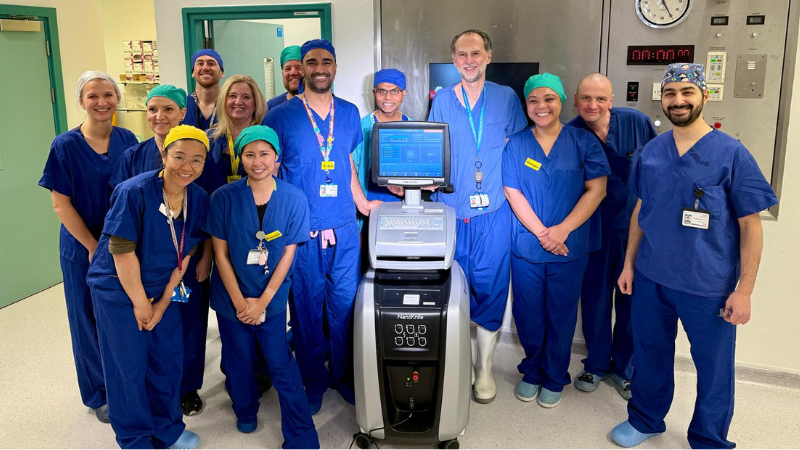
New look for hospital entrances
Date published: 10 June 2025

The urology team at Wexham Park Hospital has successfully performed its first NanoKnife procedure, a minimally invasive treatment expected to offer faster recovery and fewer major side effects compared to standard treatments such as surgery and radiotherapy.
Prostate cancer is the most common cancer among UK men, affecting one in eight. Traditional 'radical' treatments typically target the entire prostate gland, even if cancer is present on only one side. While effective in removing or destroying cancerous cells, these treatments often lead to significant ongoing problems with urinary, bowel, or sexual function.
Frimley Health is now at the forefront of the PART study, a major UK-wide clinical trial comparing the safety and effectiveness of minimally invasive 'partial ablation' techniques against standard radical treatments.
The NanoKnife procedure at Wexham Park is being evaluated alongside another partial ablation technology called High-Intensity Focused Ultrasound (HIFU). Consultant Urologist Marc Laniado, the principal investigator at Frimley Health, has been a pioneer of partial ablation techniques since 2005. NanoKnife uses targeted high-voltage electrical pulses to precisely destroy cancer cells, preserving surrounding healthy nerves and tissue.
The PART study specifically aims to determine whether targeted treatment of the cancerous area alone can offer cancer control as effective and long-lasting as radical whole-gland treatments but with significantly fewer side effects. It will also assess the potential for damage to nearby nerves and organs, aiming to reduce the risks of sexual, urinary, or bowel dysfunction.
Consultant Urologist Nishant Bedi, trained in partial ablation techniques at Imperial College London, and who is associate principal investigator for the PART study at Frimley Health, commented: “Data suggests about a third of patients who currently receive radical treatment could potentially benefit from partial ablation techniques instead. If we receive around 100 referrals per year for prostate cancer surgery, between 20 and 30 patients could potentially see better outcomes with procedures like NanoKnife.”
He added, “The risks associated with radical prostate surgery can be life-changing, often causing erectile dysfunction and urinary incontinence. These risks are substantially lower with targeted partial ablation.”
The PART study, managed by the University of Oxford, is currently recruiting patients from hospitals nationwide. Its findings will play a critical role in shaping future treatment options for intermediate-risk prostate cancer.